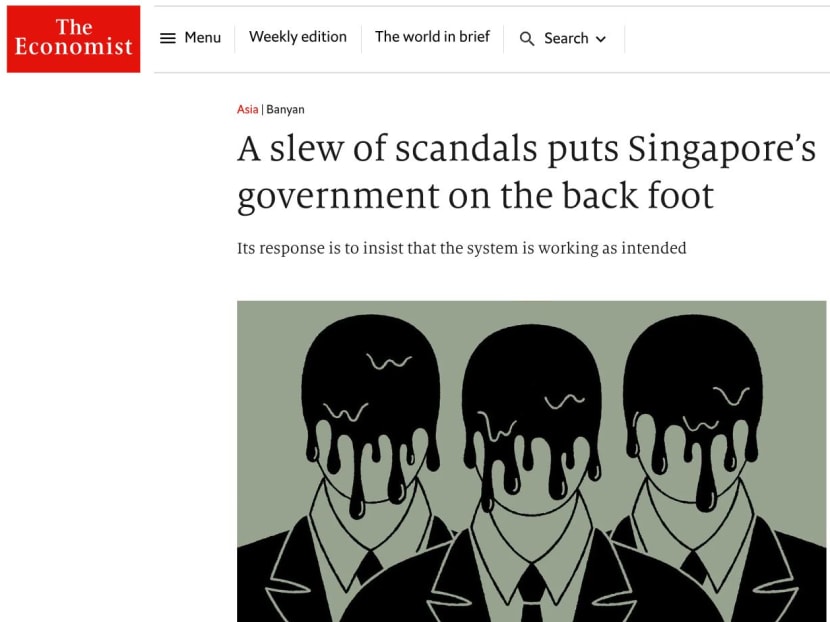'Deeply offensive': Singapore rebuts Economist column questioning CPIB's independence
SINGAPORE — Singapore’s High Commissioner to the United Kingdom on Friday (July 28) rebutted a column in The Economist which questioned the independence of the Corrupt Practices Investigation Bureau (CPIB).

The article published on July 27 made a "serious charge" by claiming that CPIB cannot be independent as the agency reports to Singapore's Prime Minister Lee Hsien Loong, says Mr Lim Thuan Kuan, Singapore’s High Commissioner to the United Kingdom.
SINGAPORE — Singapore’s High Commissioner to the United Kingdom on Friday (July 28) rebutted a column in The Economist, which questioned the independence of the Corrupt Practices Investigation Bureau (CPIB).
In a letter addressed to The Economist’s letters editor Mark Doyle, Mr Lim Thuan Kuan said the newspaper's regular Banyan column, published on July 27 and titled "A slew of scandals puts Singapore’s government on the back foot", makes a "serious charge" by claiming that CPIB cannot be independent as the agency reports to Singapore's Prime Minister Lee Hsien Loong.
In its column, The Economist laid out details of the property rentals by Law and Home Affairs Minister K Shanmugam and Foreign Affairs Minister Vivian Balakrishnan of two black-and-white bungalows on Ridout Road, the graft probe involving Transport Minister S Iswaran and the departure of Parliament Speaker Tan Chuan-Jin.
On the Ridout Road rentals, the publication noted that no wrongdoing or favours to either Mr Shanmugam or Mr Balakrishnan were found following a CPIB probe.
However, it added that as CPIB reports to Mr Lee, who also appoints its head, it “cannot be fully independent”.
In his letter, Mr Lim said the column “misrepresents the process”.
"CPIB does not require the prime minister's permission for its investigations. It sought his concurrence before initiating formal investigation of Minister for Transport S Iswaran because it involved a Cabinet minister," Mr Lim said, adding that Mr Lee concurred within a day of receiving the CPIB director’s report.
“No prime minister of Singapore has ever prevented the CPIB from investigating anyone. But even if the prime minister does not consent to CPIB investigations, under the Constitution, the director of the CPIB can still proceed with the investigations if he obtains the concurrence of the President (of Singapore).”
Mr Lim noted that this is a “constitutional provision unique among Westminster-style democracies, and added that there are safeguards for the appointment or removal of the CPIB director, which requires the concurrence of the President.
On the Ridout Road rentals, the column said that Senior Minister Teo Chee Hean, who conducted a separate review in order to address wider potential process or policy issues, "is both a friend of Mr Shanmugam’s and in the same branch of government".
“Even if everything at Ridout Road is squeaky clean, the optics are appalling," it added.
In the case of the Ridout Road rentals, Mr Lim said that it was Mr Lee who asked the CPIB to investigate the matter.
“The Bureau conducted a thorough examination and found no evidence of wrongdoing or corruption,” he said, adding that the Attorney-General’s Chambers (AGC) concurred with the finding.
He also said that Leader of the Opposition Pritam Singh accepted the CPIB’s finding and stated in Parliament that “he did not believe anybody was making an allegation that the ministers were corrupt”.
“When the CPIB completes its investigation of Mr Iswaran, its findings will be submitted to the AGC, which will decide on what to do with them,” Mr Lim said. “Such is the CPIB’s fearsome reputation for thoroughness, few Singaporeans doubt its ability to see any case of corruption to its logical conclusion.
“This is why The Economist’s charge that simply because the CPIB reports to the prime minister calls into question its independence, would strike many Singaporeans as deeply offensive and uninformed.”
Mr Lim then asked how it could be possible that Singapore has consistently ranked high in Transparency International’s Corruption Perceptions Index, “if indeed CPIB is so lacking in independence as The Economist makes out”.
He pointed out that Singapore ranked fifth in the latest Corruption Perceptions Index, published last year. The ranking puts the country behind Denmark, Finland, New Zealand and Norway, and ahead of every other Asian country.
Mr Lim also asked whether The Economist would suggest the head of Scotland Yard is not independent because he is appointed on the advice of the United Kingdom home secretary, in consultation with the mayor of London.
“The prime minister — as well as his successor, Deputy Prime Minister Lawrence Wong — are as determined as their predecessors were to investigate any case of corruption, no matter whom it involves, thoroughly and transparently,” Mr Lim said.
“Singaporeans and foreign investors alike can be certain of this.”
In an interview with the British broadcaster BBC’s Newsday programme on Wednesday, Mr Wong stressed again that the CPIB is an independent agency that has legal powers to conduct thorough investigations. CNA
For more reports like this, visit cna.asia.









